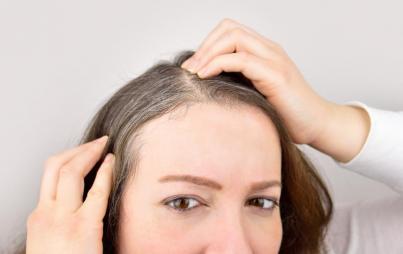
Photo by Element5 Digital on Unsplash
This article first appeared on Your Tango and has been republished with permission.
Perimenopause hit me like a ton of bricks.
One month, everything was steady and predictable. I knew when to expect my period and exactly how long it would last, and I had a pretty good idea of how I would feel throughout my 28-day cycle.
Then everything changed. The predictability ceased. For my period, the term “heavy flow” took on a whole new meaning. I experienced mid-cycle spotting in addition to all my other new menstrual cycle woes. Hot flashes, perhaps the most infamous of all the perimenopause symptoms, became a regular thing.
I went to see my gynecologist just to make sure there wasn’t some other reason for my symptoms. There was not. At 46, I’ve simply become perimenopausal, and there is no way to predict how long I’ll stay this way.
That's because perimenopause, officially defined as the season in which the body makes its transition to menopause, can last for years and years (and years).
Only when you have gone twelve consecutive months without a period have reached menopause. Average age for menopause? 51 years old. Despite menopause and perimenopause being totally normal for anyone who has ovaries, it's a women's health issue that nobody seems to discuss.
In our society, aging is treated like something to be ashamed of — and based on the profound lack of research into menopause, it can feel like the medical industry agrees.
If this feels like new information, you are not alone.
I had never even heard the term perimenopause until a couple of years ago — and that is only because a nurse friend who specializes in women’s health told me about it.
My similar-in-age pals report that they, too, were somewhat in the dark.
We knew menopause signified the end of menstrual periods but we didn’t really understand that it followed a potentially lengthy transitional phase. Or that said transitional phase would, at times, feel more annoying than PMS. Or that perimenopause could be just plain embarrassing, thanks to “gushers” (a.k.a. extremely heavy periods that soak through tampons in less than an hour) and hot flashes that strike at the most inconvenient moments possible.
In middle school, we learned a lot about menstruation in health class. We also learned a lot about it from Judy Blume — didn’t every Gen X woman read Are You There God? It’s Me, Margaret at some point?
Where are the health classes or relatable novels for people entering the perimenopause phase? Do they even exist?
I don’t know. But I do know that people like me — especially those of us nearing an age where perimenopause is likely — need more information and more resources about this significant transition.
“Most people don’t know about the changes that can occur,” says Ingrid Cherrytree, M.D., a gynecologist at Providence Women’s Clinic in Portland, Ore. “They tolerate a lot of symptoms for a long time before they decide to seek help for it.”
And she’s not just talking about heavy periods, irregular cycles and hot flashes. Those are just the tip of the iceberg. Perimenopause also brings the potential for loads of other undesirable symptoms, thanks to wildly fluctuating estrogen levels (technically speaking, estrogen production is slowing down and tapering off during perimenopause, but it can go down and up and back down again with seemingly no rhyme or reason).
According to WebMD, we’re talking about perimenopause symptoms like breast tenderness, vaginal dryness, urine leakage, sleep disturbances, low sex drive, migraines, mood swings, brain fog and weight gain. Splendid!
Fortunately, despite the fact that we have a long way to go, the subject of perimenopause is not nearly as taboo as it used to be — in part because women are talking about it more openly, rather than suffering in silence.
Since learning about perimenopause, I’ve had several gab sessions with friends about our shared symptoms in recent months, and just the other day I mentioned perimenopause to a much-younger friend and her eyes didn’t glaze over (at 33, mine would have).
Even more importantly, the topic is being addressed with greater frequency by researchers, doctors and professional organizations.
Last year, for example, the Journal of Women’s Health published the first-everguidelines for treating depression in perimenopausal women and in June the North American Menopause Society released a study indicating a possible explanation for frequent hot flashes in some women.
There was even study published in March that looked at the relationship between perimenopause and body composition/weight changes.
If you're surprised to learn that this research is new, you're not alone.
You Might Also Like: Night Sweats: Beating The Heat Of The Perimenopausal Moment
An August 2019 article in The Guardian asked the question, "The menopause: why so little research on the middle-aged ovary?"
As the article explains:
"Some scientists say they are met with puzzlement when trying to justify new research into possible treatments. Hormone replacement therapy has long been the most widely used intervention, but there is still a lack of basic understanding about how HRT interacts with a woman’s body."
To me, this is all very encouraging (not necessarily the results of the studies; just the fact that they even exist).
Maybe by the time my daughter reaches this stage perimenopause won’t be so mysterious or humiliating. And, yes — it can definitely be humiliating when, at the age of 40-something, heavy bleeding keeps you from your daily routine.
In the meantime, every woman experiencing perimenopause deserves to have her symptoms acknowledged and her feelings about the transition validated, says Dr. Cherrytree.
“They are not making it up in their head(s), they are not going crazy,” she says. “… It is true; all of these (symptoms) are happening.”
And even though perimenopause is inevitable, suffering through it doesn’t have to be. There are fixes, Dr. Cherrytree says.
“Hormones are a great option,” she says, referring to prescription-based hormone replacement therapy, like pills, patches and creams. “They are safe for a lot of women and … help control symptoms.”
And how about natural alternatives to HRT, like soy or black cohosh, known for their estrogen-like properties? Some women I know swear by them.
Dr. Cherrytree says it is perfectly acceptable to give natural alternatives a try first. However, she also points out, from a medical standpoint these products haven’t really panned out to be all that helpful. Some may even produce dangerous side effects, so proceed with caution.
“The most important thing about hormone replacement or the addition of hormones is that it is done in a safe manner with the correct balance (of estrogen and progesterone),” she says, urging women to speak to their doctor before introducing any type of hormone replacement to their regimen.
Unfortunately, there is no way to predict when perimenopause is coming, how long it will last, or how bothersome symptoms will be for any particular person.
Furthermore, there aren’t really any tests to confirm perimenopause status, she adds (estrogen and follicle-stimulating hormone levels are sometimes checked when doctors needs to sort out problems associated with perimenopause, but whacky levels are not true indicators, and normal levels don't necessarily rule out perimenopause).
The Guardian article notes that "[s]cientists are yet to decipher the chemical signals that stop ovarian follicles maturing into eggs when the overall egg reserve becomes low or uncover the role that ovarian cells other than eggs play in this process."
The only way to officially diagnose perimenopause is based on the symptoms you are experiencing
“Sometimes it is helpful to talk to other female family members to see what they went through, but it doesn’t always match up,” says Dr. Cherrytree. After all, there has been surprisingly little research into the role genetics play in determining when a person will go through menopause, let alone when they will experience perimenopause.
In other words, everyone is different and there aren’t many good ways to predict what your experience will be like.
“With some women, their period just gradually goes away. They have no hot flashes, no vaginal dryness. Things are just kind of easy and they are like ‘oh, wow, that just kind of stopped and I barely noticed,” Dr. Cherrytree says. “For other women, it is a complete disaster.”
And either end of the spectrum — or somewhere in between — is perfectly normal, she says.
The key is figuring out how to adapt to your new reality so you can get through perimenopause relatively unscathed.
For me, this means dressing in layers in case of untimely hot flashes and carrying around feminine hygiene products at all times (I’ve noticed that ‘gushers’ can come out of nowhere). I’m also considering hormone replacement therapy, experimenting with some dietary changes to avoid weight gain and, most importantly, talking about it like it is a normal thing … because it is a normal thing.
Oh, and about that weight gain. This is, naturally, one of the biggest concerns among the women I’ve talked to about perimenopause. Excess abdominal fat? No, thank you. Sadly, our hormones are not working in our favor at this point.
While she stopped short of calling weight gain inevitable, Dr. Cherrytree did say that some people — even those with very healthy habits — have to figure out a new way of eating and a more efficient exercise routine, and not just in regards to your weight.
“It is sort of like you have to reevaluate everything, and that is the hardest part,” she says.
As someone going through perimenopause right now, I can confirm that feeling like everything you knew about your body and the way it works can be unsettling. But the more we talk about it — and the more the medical and scientific communities work to support us and learn more about perimenopause (and menopause, too, for that matter) — the better off we will be.








